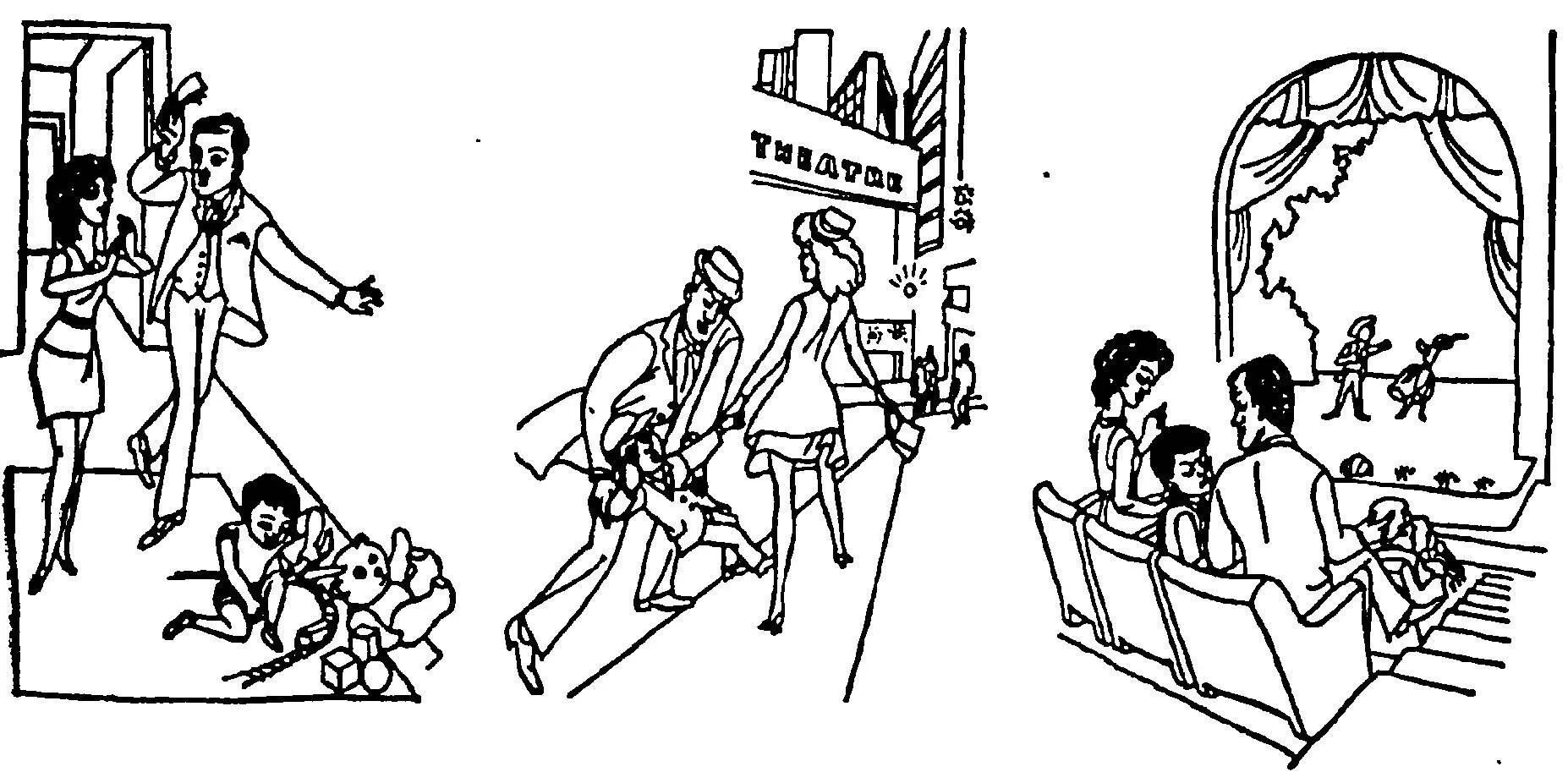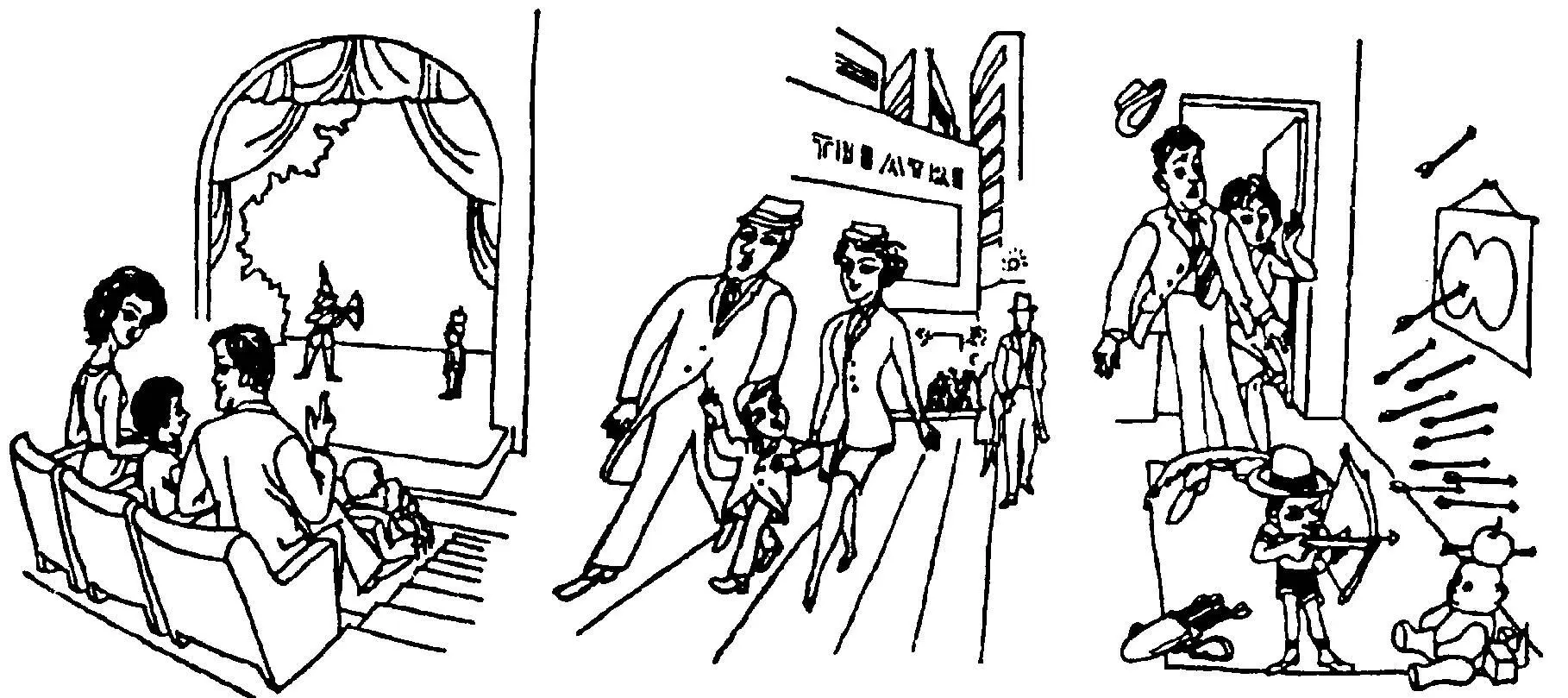Яков Аракин - Практический курс английского языка 2 курс
- Название:Практический курс английского языка 2 курс
- Автор:
- Жанр:
- Издательство:ВЛАДОС
- Год:2005
- ISBN:нет данных
- Рейтинг:
- Избранное:Добавить в избранное
-
Отзывы:
-
Ваша оценка:
Яков Аракин - Практический курс английского языка 2 курс краткое содержание
I - V курсов педагогических вузов.
Цель учебника – обучение устной речи на основе развития необходимых автоматизированных речевых навыков, развитие техники чтения, а также навыков письменной речи.
Практический курс английского языка 2 курс - читать онлайн бесплатно полную версию (весь текст целиком)
Интервал:
Закладка:
Q u e s t i o n : How has television affected the theatre?
A n s w e r : Well, its popularity means that millions of people take drama for granted.
With hours and hours every week, the viewer can have a bellyful of drama. If you're going to attract
a man and his wife away from their TV set on a winter's night, and hold them to a play in a theatre,
you've got to grip them and keep them gripped.
Now, you do have certain advantages in the theatre. The telly is perfect for the things that
have been specially built for it. But the TV screen cannot give you the peculiar condition of the
theatre, where we are allowed to get back to life-size people in relation.
Q.: Is there any particular hobby-horse that you ride in your work as actor and director?
A.: I rely greatly on rhythm. I think that is one thing I understand — the exploitation of
rhythm, change of speed of speech, change of time, change of expression, change of pace in crossing
the stage. Keep the audience surprised, shout when they're not expecting it, keep them on their toes
— change from minute to minute.
What is the main problem of the actor? It is to keep the audience awake.
O.: How true is it that an actor should identify with a role?
A.: I don't know. I can only speak for myself. And in my case it's not 'should', it's 'must'. I just
do. I can't help it. In my case I feel I am who I am playing. And I think, though I speak only from my
own experience, that the actor must identify to some extent with his part.
In "Othello" the passage from the handkerchief scene through to flinging the money in
Emilia's face is, pound by pound, the heaviest burden I know that has been laid upon me yet by a
dramatist.
And Macbeth. Do you know what is the first thing to learn about playing Macbeth? To get
through the performance without losing your voice.
(From Moscow News,
1969, No 10, Fragments)
b) Try your hand at teaching:
A. Preparation. Think of interesting questions on Sir Laurence Olivier's interview.
B. Work in class. Make your friends answer your questions.
XI. Sole-playing.
At a Theatre Festival
St. A: a famous producer
St. В.: a celebrated actor
St. C: a talented young actress, who made an immediate hit with her sensitive and moving
performance
Rest of class: a journalist, a critic, a playwright and theatre-goers
All are invited to the studio.
XXI. a) Translate the following fragments into Russian (in writing)!
A.There are many people whom the theatre fills with an excitement which no familiarity can
stale. It is to them a world of mystery and delight; it gives them entry into a realm of the imagination
which increases their joy in life, and its illusion colours the ordinariness of their daily round with the
golden shimmer of romance.
W. S. Maugham
B.In the Theatre we are proud to serve, ideas merely play like summer lightning over, a deep
lake of feeling; the intellect may be quickened there, but what is more important is that the
imagination of the spectator begins to be haunted, so that long after he has left the play-house the
actors are still with him, still telling him of their despair and their hope.
J. B. Priestley
b) Comment on the fragments above.
ХIII. Speak individually or arrange a discussion on the following:
1. Why is it that people go to the theatre? What do they look for there?
2. What is your favourite theatre and why?
3. The fragment above (Ex. XII B) describes the case when "the imagination of the spectator
begins to be haunted so that long after he has left the play-house the actors are still with him..." Is the
experience familiar to you? After what play did you have it last time?


4. What is the romantic side of the theatre?
5. What is the educational role of the theatre? Do you agree with Priestley (see the fragment
in Ex. XII B) that the theatrical art appeals rather to the spectator's imagination and feelings than to
his intellect? Give your reasons.
XIV. Try your hand at teaching. 1. Say what you would do in the teacher's
position:
Michael, a bright, young, soon-to-be fifth-former, confessed to his teacher that in his view
school was no fun, the teachers were no good, summer should last forever and dogs were lucky
because they didn't have to go to school. The teacher protested that school was important. But
Michael, who didn't share the teacher's opinion, answered with a one-word question "Why?".
2. Respond to the following modestly. Here are a few possible ways of
beginning answers:
Oh, it was nothing. The real credit should go to .... I had very little to do with it. It wasn't
difficult at all, really. Thank you, but it's not really all that good. Oh, you're exaggerating, I played
only a small part in the whole thing. It was very much a team effort. You're very kind, but really
anyone else could do it.
S c e n a r i o
A.: I've never seen such an attractive and talented class of children. I think you, as their
teacher, deserve the highest praise.
You: ...
A.: I'm sure they are splendid, but I don't agree that you don't deserve any credit. I know you
planned the lovely decorations in their classroom, for a start.
You: ...
A.: I'm sorry, I just can't believe it had nothing to do with you. And even if they had the
original idea, I'm sure you guided them in their work.
You:...
A,: Oh, come on, it can't have been easy and I don't agree that anyone could have done it
(From Making Polite Noises by Hargreaves and M. Fletcher. Lad" 1979)
3. Classroom English. (Revision);
a)It's the last period on Saturday. The lesson is coming to an end. You are pleased with the
work you and the pupils have done. You find that you just have about 3 — 4 minutes to have the
exercise books collected and the board cleaned. You inform the class that they will have to finish the
exercise off at home, tell them you are pleased with their progress, set the homework and state
briefly what you are planning for the next lesson. After that you ask your pupils to tidy up the room
and to be quiet when they go outside. You wish them a nice weekend and say good-bye.
b)It's a routine English lesson in the middle of the term. The lesson isn't going too well You
are trying to keep your pupils interested in the exercises you are checking. You get them to read the
sentences in turn and correct their mistakes, but the pupils are tired and find it difficult to concentrate
on the work. Some of them start chatting and fidgeting. You try not to show your annoyance and
proceed checking the exercise.
c) You've got a lot of work to get through in this lesson. You ask the pupils to do an exercise
from the textbook silently. You check that they all have the right place. When your pupils have
looked through the exercise you want everybody to read three sentences each. You comment on their
work. In the remaining five minutes, you have a quick vocabulary test on the blackboard. You make
sure that the board is properly prepared, and ask 2 or 3 pupils to write the test. You keep the rest of
the class involved and comment on the work.
d) It's a revision lesson. You've brought to the classroom a map of Britain, some slides and/or
pictures of London and a slide projector. You ask one of the pupils to help you fix the map and
pictures on the board and get the slide projector ready. The pupils point out on the map the most
important towns, rivers, mountain chains or anything you find necessary to mention. After that they
speak briefly about London sights making use of the pictures and slides. You keep making notes
while they speak and comment on their work at the end of the revision lesson.
e) At the end of the term you find it necessary to have a brief revision of the book your pupils
are reading. Your idea is to ask the pupils a number of questions to encourage a discussion. You think
the questions over very thoroughly beforehand and ask your class to answer them. You are interested
in everyone's point of view and react to comments appropriately, trying to keep the conversation
going.
XV. Describe these pictures: Use the following:
a) to come home greatly excited, to wave some slips of paper in the air, to be delighted, to
have great fun playing with one's toys; b) to drag smb. along the street, to howl at the top of one's
voice; c) to have excellent seats, "Wilhelm Tell" was on, the music was so loud you couldn't hear a
word, to be bored; d) that was much better, to catch smb.'s interest, a bow [bзv] and arrows, to shoot
off ah apple from...; e) in very high spirits, to chatter about one's impressions, to be pleased; f) to be
shocked, the child's imagination was certainly haunted by the opera or, rather, by one particular
scene, the poor teddy-bear, to look extremely uncomfortable.
XVI. Film "Mr. Brown's Holiday". Film segments 9 "One More Substitute"
(Yeovil) and 10 "Back at Ноmе" (London), a) Watch and listen, b) Do the exercises
from the guide to the film.
STUDIES OF WRITTEN ENGLISH
IX
One of the most effective exercises in good writing is a free composition.
Free composition is a piece of independent writing (3—5 pages in length). You are free to
select the subject, to decide on the pattern of writing (narrative, descriptive, argumentative,
expository), and to choose writing technique (keywords, topic sentences, connectives and
transitions).
In the process of free composition there are three main points to consider: what to say —
selection of a subject and the theme, how to arrange the material in the best order, and how to
express your thoughts in the best possible language.
The theme and subject should be selected with care so that you know exactly what you mean
to write about and what is the purpose of writing — is it describing, entertaining, persuading or
instructing?
"The British Isles" is, for instance, of descriptive nature, "How We Kept Mother's Day" is
both entertaining and instructing, Judy's letters are sincerely persuading.
Composition must be unified and complete. It must have a beginning, middle, and end. It
must be coherent; that is, systematic in its presentation, with reference to time, to point of view, and
to situation. It must reveal your attitude or judgement towards material and characters or towards
your reader, or both.
The beginning, or introductionexpresses the occasion, the problem, and the purpose. A
good beginning attracts the reader's attention, his interest and sometimes his emotions (see the
beginning of "How We Kept Mother's Day" or of "A Friend in Need").
Читать дальшеИнтервал:
Закладка:





![Владимир Аракин - Практический курс английского языка 3 курс [calibre 2.43.0]](/books/1072035/vladimir-arakin-prakticheskij-kurs-anglijskogo-yazyk.webp)




